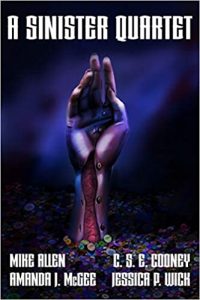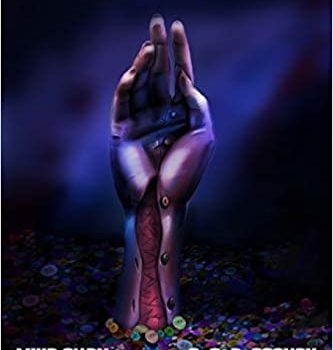Ian Mond Reviews A Sinister Quartet by Mike Allen, C.S.E. Cooney, Amanda J. McGee & Jessica P. Wick
 A Sinister Quartet, Mike Allen, C.S.E. Cooney, Amanda J. McGee & Jessica P. Wick (Mythic Delirium Books 978-1732644038, $19.99, 380pp, tp) June 2020.
A Sinister Quartet, Mike Allen, C.S.E. Cooney, Amanda J. McGee & Jessica P. Wick (Mythic Delirium Books 978-1732644038, $19.99, 380pp, tp) June 2020.
With fiction from C.S.E Cooney, Jessica P. Wick, Amanda J. McGee, and Mike Allen, Mythic Delirium’s excellent new anthology, A Sinister Quartet (edited by Mike Allen), provides further evidence that long-form genre fiction is not just alive and well but thriving. The book opens with Cooney’s sublime short novel “The Twice Drowned Saint”. Our narrator is Ishtu Q’Aleth (Ish for short), the new owner of Gelethel’s only cinema (having taken over from her father). More importantly, she’s also the secret saint of Alizar the Eleven-Eyed, Seventh Angel of Gelethel, and one of the fourteen angels who holds dominion over the city. As Ish explains it, at the age of eight she turned down Alizar’s offer to be his saint, but, in a moment that speaks to the novel’s charm, the young girl and the all-knowing angel agreed to continue their relationship in secret after bonding over their shared love of cinema. Near 30 years later Ish is desperate to get her sick parents out of the city, a near-impossible task given Gelethel is surrounded by an impenetrable blue serac. But Ish’s situation grows even more complicated when a new arrival to the city, a girl named Betony, appears as Alizar’s true saint. There’s so much to adore about the “The Twice-Drowned Saint”, everything from the inventive worldbuilding that fuses technology with magic; to the byplay between Ish and Alizar; to the Jekyll and Hyde nature of Ish’s Uncles forced to lend their bodies to the incorporeal angels, while also doing what they can – when their minds are their own – to undermine Gelethel’s cruel rulers. I particularly fell for Ish, though. More than her jaded but not overly cynical perspective, and her lively relationship first with Alizar and then Betony, it’s her love for cinema, and especially her father’s movie scripts that will sadly never be produced, that makes her such a wonderfully sympathetic character.
Like “The Twice-Drowned Saint”, Jessica P. Wick’s novella “An Unkindness” puts family front and centre. When Princess Ravenna notices that her bouncy and gregarious brother, Prince Aliver, no longer has regard for his usual routine, she decides to find out why. Rather than confront him, Ravenna sneaks after Aliver, unsuccessfully at first, but eventually tracking her brother to a hedge maze called the Labyrinth of Three Fairy Ladies. There, to her horror, she witnesses the Prince vanish beneath the surface of a spring at the heart of the maze. Ravenna, of course, follows him, sliding underneath the water into the Land of Fairy, where she gate-crashes a masked Fairy Ball, and watches as the other attendees do horrible things to a unicorn and then slice open Aliver’s chest and cut out a piece of his heart. Unicorn cruelty aside, “An Unkindness” adroitly weighs the tight bond between siblings against the binding contract between a human and fairy. And for all her wide-eyed innocence, typical of a person who has never experienced hardship, Ravenna, like Ish before her, is a well-drawn character motivated by a sense of justice, and a great deal of stubbornness, but above it all, a deep love for her brother.
A sibling relationship (this time between sisters) plays a vital part in Amanda J. McGee’s “Viridian”, a retelling of the French folktale “Bluebeard”. Looking to put distance between herself and the recent death of her sister, Lorelei Adams leaves Texas and takes up residence in Burlington VT. On a ferry crossing Lake Champlain she meets handsome, suave Ethan Locke. They spark up a conversation that leads to a couple of dates and ends with Lorelei moving into Ethan’s palatial estate, Evergreen. When Ethan pops the question, Lori doesn’t hesitate. She isn’t aware, though, that Ethan has been married five times, that he murdered at least four of his wives, and that deep within the mansion, behind a locked door, hides a terrible secret. McGee’s take on “Bluebeard” is less a warning against curiosity or a critique on the patriarchy and more a meditation on grief. As such, McGee places less emphasis on what Ethan is hiding behind that locked door (though the truth is far stranger and more disturbing than what Charles Perrault dished up in 1697) and focuses more on Lori’s struggle to deal with the death of her sister Annie (whose name echoes that of the sister from the original tale). While that does mean that Lori – already psychologically wounded – has less agency than I might have liked (she takes a tad too long to move against Ethan), this is still a fascinating and bold approach to a 300-year-old folktale.
The editor of A Sinister Quartet, Mike Allen, caps off the collection with the modestly titled “The Comforter”. I say modestly because the story is anything but. From the opening chapter, where a woman in high heels shoves her manicured hand down the throat of a homeless person, “The Comforter” is a mind-bending mix of the strange, the inexplicable, and the outright horrific. The narrative toggles between several viewpoints, but mostly centres on Maddy, a teenager and foster-kid, who believes she shouldn’t exist. When she starts receiving weird notes underneath her desk at school (“my mom stole your mom’s skin / my mother will stitch us together“) rather than freak out, Maddy searches for the author, hoping they can explain how she came to be. I can’t say I fully understood “The Comforter”. I’m sure I’d have been more in tune with the novella if I’d read the two stories that precede it – “The Button Bin” and “The Quiltmaker” – but the introduction of so many characters and multiple switches in perspectives only fuelled my befuddlement. What is clear is that Allen knows his way around cosmic horror; his Lovecraftian-inspired monsters, with the ability to incorporate all organic matter into their being (or what they call the Quilt), are a brilliant example of the alien and the uncanny, and a terrific contrast of the impossible and the anodyne – you’ll never look at buttons and thread the same way again.
This review and more like it in the October 2020 issue of Locus.
 While you are here, please take a moment to support Locus with a one-time or recurring donation. We rely on reader donations to keep the magazine and site going, and would like to keep the site paywall free, but WE NEED YOUR FINANCIAL SUPPORT to continue quality coverage of the science fiction and fantasy field.
While you are here, please take a moment to support Locus with a one-time or recurring donation. We rely on reader donations to keep the magazine and site going, and would like to keep the site paywall free, but WE NEED YOUR FINANCIAL SUPPORT to continue quality coverage of the science fiction and fantasy field.
©Locus Magazine. Copyrighted material may not be republished without permission of LSFF.






